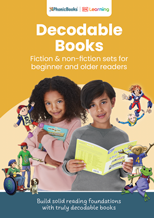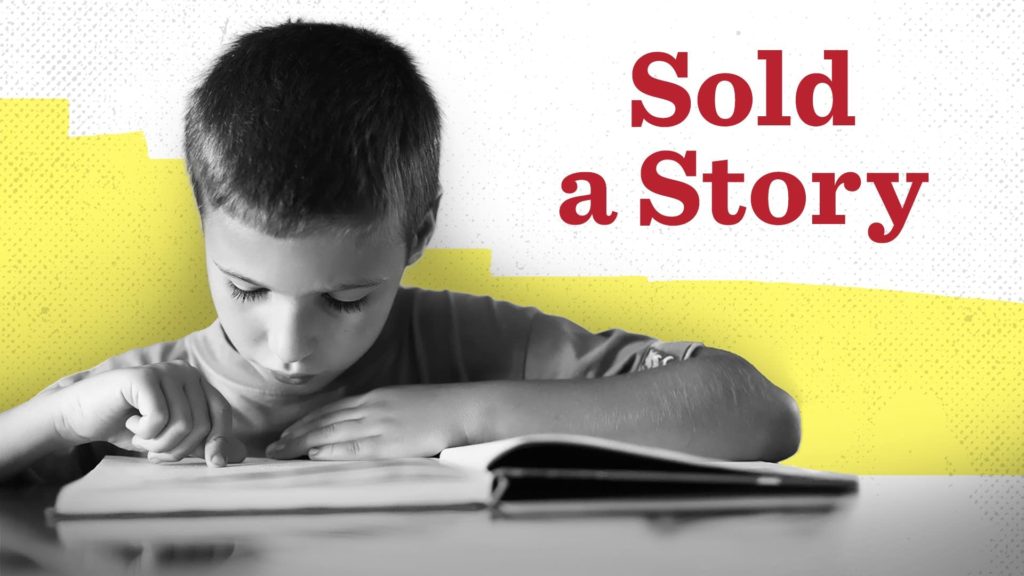Emily Hanford’s thought-provoking podcast, “Sold a Story” has created quite a buzz in the education community.
Reading specialist and SLP, Miriam Fein, has been listening:
“It didn’t seem like they were teaching them to read. It seemed like they were teaching them to sound like they could read”. (A parent, in “Sold a Story”, Episode 1).
“Sold a Story: How Teaching Kids to Read Went So Wrong”

“Sold a Story”, a 6-episode newly released podcast series, is the latest reporting project from Emily Hanford and the team at American Public Media. Hanford’s deep dive into how children learn to read, how reading is taught, and why some struggle, has had a big impact. It has led many educators and parents to ‘ah-moments’ and helped to fuel the current movement to change practices to align with the scientific evidence. Hanford’s reporting began five years ago with an investigation into why children with dyslexia were having trouble getting help in school, an investigation that led to several documentaries and articles about reading instruction. In “Sold a Story”, Hanford employs a different narrative style. Judging from the response so far, many are finding it riveting, and it has attracted a wider audience than her previous work.
Marie Clay’s approach
We hear Marie Clay’s own voice explaining her ideas, and we learn how a misconception about what children need to learn evolved into an appealing approach to teaching reading that has spread to become deeply embedded in teaching practices, curriculum, and assessment materials. We hear the voices of teachers who embraced these ideas and of teachers who began to question them, sometimes as a result of watching their own children struggle to learn to read. We hear from parents and researchers. And we learn about what privilege, politics, and money have to do with it, too. We also hear Hanford’s voice and her signature knack for cutting through murkiness with plain language and clear explanations. With the help of researchers, she explains why leveled books are not a reliable way to determine a child’s reading ability. She explains why “the books at the lowest levels… are written to encourage children to use the pictures and the context to get the words. Not sound them out.” And she explains why sounding words out is so critical.
The path to reading fluency

I was especially struck by one bit from an interview with Marie Clay in episode 2, “The Idea”:
“The easy text gives the child a chance to practice all the reading strategies that they’ve learnt so far. Ah, to put some of the complicated, uh, behaviors together which I sometimes call “orchestrating” the reading behavior. To do fluent reading right from the very beginning… “
“To do fluent reading right from the very beginning…”
We now understand that reading fluency, like fluency in any skill, is not possible from the very beginning. Fluency is the outcome. The path to fluency in reading involves laboriously sounding words out, a task that can be quite difficult for many children and requires explicit instruction. A teacher who is taught that the goal is to “do fluent reading right from the very beginning,” may find it quite uncomfortable to listen to beginning readers putting in the painstaking work that will ultimately lead to fluency at a later stage.
Closing thoughts
As I listen to ‘Sold a Story’, I find myself thinking about how hard it is to question people who are admired by those we trust and respect; how unlikely we are to question ideas that are presented as unassailable; how human it is to set aside doubts and quickly resolve any uncomfortable cognitive dissonance instead of letting it push us into updating our beliefs; how vulnerable we all are to popularity and group-think. And how important it is to guard against these things and foster a culture of questioning, debate, and critical thinking.
The final episode of ‘Sold a Story’ will be released on November 17.
#soldastory #scienceofreading #structuredliteracy #educationresearch
* * *
This is a guest blog by Miriam Fein. Miriam is a speech-language pathologist and licensed reading specialist. She lives near Boston, Massachusetts, and supports students from early elementary through high school with reading, spelling, writing, and language skills. She believes in the power of evidence-informed, systematic, and compassionate teaching for all learners.
“Sold a Story” is a production of American Public Media with funding from the Hollyhock Foundation, the Oak Foundation, and Wendy and Stephen Gaal.
Senior Correspondent, Producer and Host is Emily Hanford
Images courtesy of Emily Hanford and American Public Media



Thank you Miriam. Yes, I too have been mesmerized by Emily’s previous webinars and Sold A Story is a WOW! I can’t wait to hear tomorrow’s podcast. I wonder if it will be out at 12:00 AM EST so I can listen to it at 9:00 PM PST? My other resounding Yes – Oh, how hard it is to question perspectives – in our school systems we are often told to follow a program with fidelity and if we do, knowing it is wrong we fail ourselves and our students, and yet if we sneak around and do what we know children need, we live in fear of being “caught.” Teaching can be so fulfilling, and also so very lonely. We need peers and collaborators each and every day to enjoy coming to work, and most importantly to make a difference for our students. Thank you for your blog and for your exceptional products. Diana Weir
Thanks so much for reading and commenting, Diana. That’s a great point about how fulfilling, but how lonely teaching can be. Opportunities to connect and collaborate (and question and challenge each other) are much needed, but often lacking.
I have listened to and recommend this podcast and have been ah’d and validated…. My fellow teaching friends are now wanting to discuss and reflect together. Have you developed any discussion questions to help a group of educators build goals in their school?
Hi Tammy, Thanks for commenting on this post. We were very interested to hear your plan for a group discussion around Sold a Story – it’s so important to listen and share opinions and ideas. Unfortunately, we don’t currently have a list of discussion questions available, but that’s a great idea. If anyone has created a list, please feel free to share.